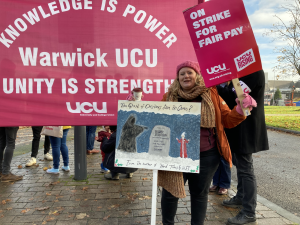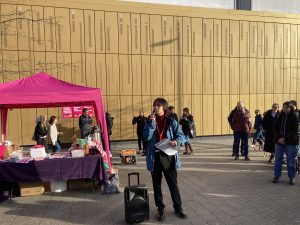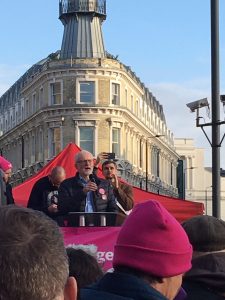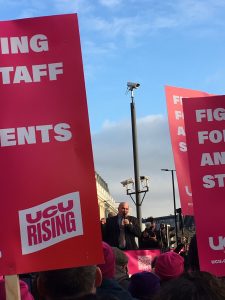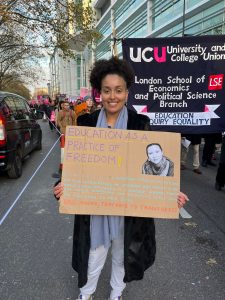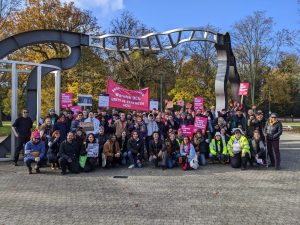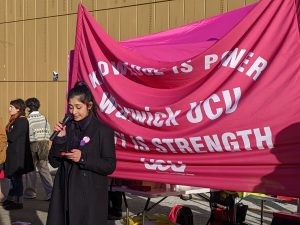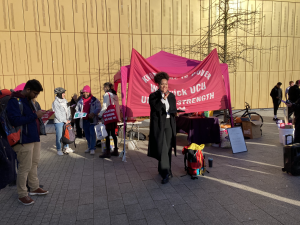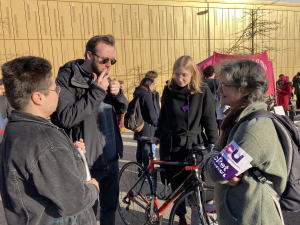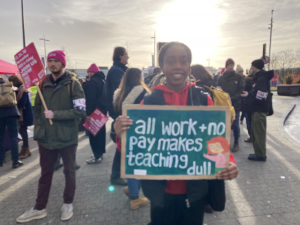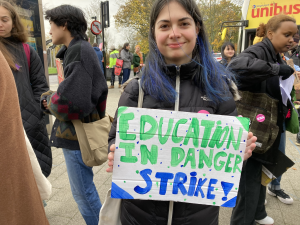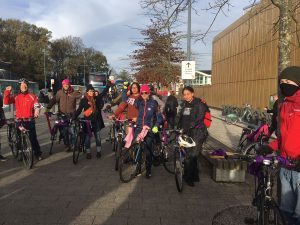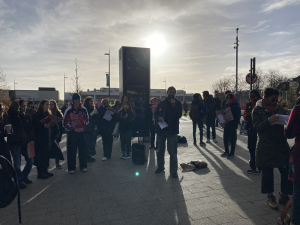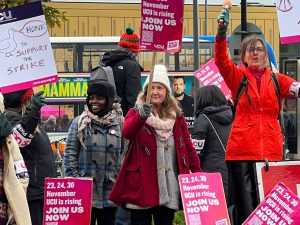This is a two-ballot campaign, but the issues are united: it is a strike about dignity and equality. It is a strike about casualisation; about the gender, disability and ethnicity pay gaps; and it is a strike about whether we will be able to grow old with dignity. These issues are all connected, but we are going to talk a bit about the two ballots separately.
Pensions
We were just on strike about pensions just less than two years ago? Why are we doing out again?
The Universities Superannuation Scheme (USS) conducted a valuation in March 2020, as markets were crashing during the COVID-19 pandemic, and claimed that contribution rates needed to increase very significantly from the rate of 30.7% of salary (9.6% for members, 21.1% for employers) that was established under the 2018 valuation.
Both UCU and the employer representative, Universities UK (UUK) argued that these increases were not necessary and had not been properly justified. However, instead of continuing to challenge the increases, UUK pushed through major cuts to the guaranteed, defined benefit (DB) element of the scheme to prevent employers from having to pay higher contributions.
The UUK cuts, which were formally voted through in February 2022 and came into force on April 2022, drastically reduced the level of guaranteed retirement income provided to members of USS for their future service (benefits already built up will not change). The cuts affected every active USS member but especially those nearer the start of their careers.
These cuts came in the context of a decade of detrimental changes to USS contributions and benefits. As UCU previously showed, the changes that had already taken effect between 2011 and 2019 would make a typical member of staff £240,000 worse off over the course of their career and retirement. The 2022 cuts from UUK have made things even worse: new research shows that global loss across current USS scheme members is £16-18bn, with those under the age of 40 losing between £100k-£200k each in retirement. It also shows that 196,000 staff will lose between 30%-35% from their guaranteed future retirement income.
UCU is demanding that vice-chancellors order their employer body UUK to revoke these brutal cuts and put pressure on USS to restore benefits to 2021 levels, especially after a drastic improvement to USS finances was revealed by the trustee in March 2022: USS reported assets increasing to over £88bn, and the trustee said that growth outstripped liabilities and that the level of contributions required to service the deficit fell to 0%.
Update, October 2022: The majority of pension benefits lost under cuts drawn up by UUK could be retroactively paid back, returning around £0.5bn to the retirement funds of the 200,000 university staff in the pension scheme. Employer body UUK forced through a package of cuts in April 2022, which included a cut to pension accrual rates and a cap on protection against inflation. But, under pressure from UCU, the Universities Superannuation Scheme (USS) trustee has released new information which shows the scheme is in such a healthy position that those lost benefits could be paid back, backdated to April—and still leave the scheme in surplus.
Pay & Equality
What are UCU’s demands in the pay and working conditions dispute?
On the pay and working conditions dispute, UCU demands:
- an increase to all spine points on the national pay scale of at least inflation (RPI) + 2% or 12% whichever is the higher
- nationally-agreed action, using an intersectional approach, to close the gender, ethnic and disability pay gaps
- an agreed framework to eliminate precarious employment practices by universities
- nationally agreed action to address excessive workloads and unpaid work, to include addressing the impact that excessive workloads are having on workforce stress and ill-health
- for the standard weekly, full-time contract of employment to be 35 hours, with no loss of pay.
UCU set out its demands in detail in the annual claim which it presented to employers in March 2022, along with the other unions that represent university staff (UNISON, Unite, GMB, and EIS in Scotland). You can  read the full claim here [399kb], and this sets out the issues in extensive detail and discusses the action which the unions want employers to take. You can also
read the full claim here [399kb], and this sets out the issues in extensive detail and discusses the action which the unions want employers to take. You can also  read the employers’ confirmed final offer for 2022-23 here [295kb].
read the employers’ confirmed final offer for 2022-23 here [295kb].
Please note that, for the pay and working conditions dispute, the union negotiates with Universities and Colleges Employers Association (UCEA), which is separate from Universities UK (UUK).
Why are we taking action on pay when the employers have offered a 3% pay rise?
The final offer made by Universities and Colleges Employers Association (UCEA) is well below inflation (which stands at RPI 12.6% as of September 2022). This means yet another real terms pay cut for staff during the cost of living crisis in the United Kingdom.
The value of pay in higher education fell by 17.6% relative to inflation between 2009 and 2019. You can use UCU’s HE pay modeller to see how much your pay has deteriorated over this period. Based on the employers’ offer and the most recent inflation data, that figure is now approximately 25%. With inflation forecast to keep increasing in the short to medium term, salaries will continue to fall further and further short of the cost of living.
Among other things, UCU is demanding a pay uplift of 12% or Retail Price Index (RPI) plus 2% on all pay points, to keep up with the cost of living and to catch up with pay lost over previous years.
Meanwhile, employers are failing to take effective action to tackle the persistent gender and ethnicity pay gaps that exist in the higher education sector. We need to send a strong signal that we will not tolerate continued pay erosion or pay inequality.
Why is tackling casualisation a priority in the pay dispute?
According to UCU’s report, ‘Precarious work in higher education’, around one-third of all academic staff are employed on fixed-term contracts; this figure rises to almost half for teaching-only academics (44%) and over two-thirds (68%) for research-only staff. Despite the negative press and widespread campaigning, 18% of all higher education institutions still use zero-hours contracts for employing academic staff (equating to 29 institutions employing 3,545 academic staff on these discredited contracts). Despite the employers’ claim of progress in this area—and important victories achieved by UCU members at Open University and Royal College of Art—precarity and casualisation continue to be rife within higher education.
The use of casual contracts erodes the rights, protections, and security that should be afforded to all employees. Casualisation also makes it much more difficult for staff to challenge employers about key workplace issues, because staff are often reluctant to ‘rock the boat’ and risk their employment being terminated. In fact, according to a February 2022 report from the Joint Committee of Experts of UNESCO and the International Labour Organization, the growth in casualised contracts in higher education has undermined academic freedom itself. Throughout the COVID-19 pandemic, employers have chosen not to renew casualised contracts and made thousands of staff redundant, while many UCU members who have found work have felt pressured to work in-person or take other risks to keep themselves in employment.
Finally, casualisation has other serious consequences for staff—UCU’s previous research showed that 42% of staff on casual contracts struggled to pay household bills, while many others struggle to make long-term financial commitments like buying a house. In our 2019 survey of 3,802 casualised staff in higher education, 71% of the respondents said their mental health had been damaged by working on insecure contracts and 43% said it had impacted on their physical well-being.
UCU is demanding that employers agree to a framework to eliminate precarious employment practices and casualised contracts, including zero hours contracts, from higher education; converting hourly paid staff onto fractional contracts; agreeing national guidance to end the outsourcing of support services in higher education and to bring staff into in-house employment.
Why are we linking pay, equality, workload and casualisation in one dispute?
The UCU rising campaign is about demanding fair treatment for staff across the higher education sector and a comprehensive remedy for the way in which your working conditions have been undermined over the past decade.
The combination of pay erosion, unmanageable workloads, and the widespread use of insecure contracts has undermined professionalism and made the working environment more stressful for staff.
UCU’s 2021 workload survey (published June 2022) showed that academic staff are working on average 51.3 FTE hours per week (i.e. more than 2 unpaid days each week), academic-related professional services (ARPS) staff are working an average of 44.4 FTE hours per week (i.e. equivalent of one additional unpaid day every week), and staff on fractional contracts can be working 2-3 times the hours that they are paid for each week. Workload has been exacerbated too by ever-increasing administrative burden, reduction in staff members, and the COVID-related changes to teaching and learning: 33% of higher education respondents said their workload was unmanageable most of the time or entirely unmanageable. UCU is demanding agreed action to address excessive workloads and unpaid work; action to address the impact that excessive workloads are having on workforce stress and mental ill-health; that workload models and planning take into account COVID pandemic related changes in working practices. UCU is also demanding that the standard weekly full-time contract of employment to be 35 hours per week at all higher education institutions with no loss of pay.
The pay gap between Black and white staff stands at 17% and the disability pay gap is 9%. The mean gender pay gap is 16% and at the current rate of change it will not be closed for another 22 years. UCU is demanding an end to pay injustice: meaningful, agreed action to tackle the ethnic, gender and disability pay gaps.
Finally, workload, pay inequality and casualisation are all directly interrelated and compound one another. Women, Black and disabled staff were all disproportionately likely to report that their workload had increased, and the same groups are also disproportionately likely to be on casualised rather than permanent contracts.
Don’t we need to campaign for more funding for the sector before we can get a significant pay rise and more investment in staff?
UCU has always campaigned for a better and more fairly funded sector and will continue to do so. However, employers can already afford to invest more in staff with the money they have. The proportion of universities’ money which they spend on staff has decreased over time, hitting a low of 51.6% in 2019-20. Employers are choosing to spend money on other things, rather than suffering from low income in general: university accounts demonstrate that investment in staff has been deprioritised in favour of investment in buildings and the hoarding of increasing reserves, which were £46.9bn in 2019-20, and have more than tripled since 2009-10. University leaders also confirmed to the regulator the Office for Students (OfS) that they were planning to increase overall capital expenditure by 36% this year, to £4.6bn.
At the same time, the sector’s overall income is higher than ever and keeps increasing. It has increased every year for the past five years at a rate that comfortably exceeds every measure of inflation. Admissions from both domestic and non-EU international students have increased. The most recent figures show that the income of higher education institutions rose to £41.1bn in the financial year 2020-21. Universities finished 2020-21 with £3.4bn more cash in the bank than year before. You can use UCU’s HE institution data tool to check the financial status and the head of institution remuneration for the financial year 2020-21.
Employers are wrong to claim that there is no money to offer more than 3% on pay, or move more staff onto permanent contracts, or create more posts to keep workloads under control, or promote and give secure contracts particularly to women and Black and disabled staff.
Finally, UCU is open to solutions that will allow employers to budget ahead and gradually shift the balance of their expenditure in favour of staff over a period of a few years, rather than immediately: for instance, via a multi-year pay agreement, or via medium-term action plans to move more staff onto secure contracts or close the equality pay gaps.



